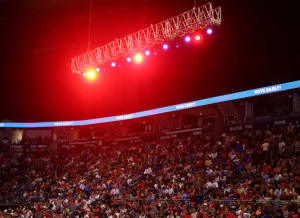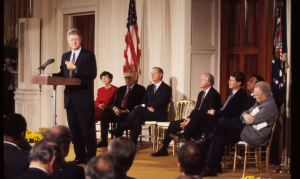Survey finds distrust between Democrats and Republicans but most voters believe election results will be accurate

Nearly half of US voters think government does a poor job of representing ordinary people, half are skeptical that self-governance is working, and three-quarters think democracy is under threat, according to one of the last polls before the 5 November presidential election.
The survey, published on Sunday by the New York Times in collaboration with Siena College, sketched out a deeply divided political landscape. Both sides of the divide expressed distrust of the other – and doubts in general about the US’s brand of democracy.
But they come together with an overall perception: a majority said the country was plagued by corruption, with 62% saying that the government was mostly working to serve itself and elites than any broader purpose of collective good.
Fifty-eight per cent of voters in the survey indicated that the country’s financial and political systems needed major changes or a complete overhaul.
A separate national poll published a day earlier found that Kamala Harris was deadlocked with Donald Trump as he seeks a return to the White House – a slip of three points for the vice-president from a similar poll earlier in October.
That poll sparked fears among some that the Democratic candidate could lose the popular vote – a reversal of the four last elections. Both candidates stand at 48% nationally, down from 49% for Harris and up from 46% for Trump weeks earlier.
One glimmer of positivity from the latest poll surveying trust in US democracy: nearly 80% of voters from both main parties and independents said they trusted the results next week would be accurate, despite Trump’s sustained efforts to question the integrity of the vote in this race and the one he lost to Joe Biden in 2020.
That’s an improvement from two years ago, when only about 70% said they were confident in the results.
But the survey figures also pointed to a deep distrust of the information universe: 21% said the mainstream media was good for democracy, and 55% said it was bad. For social media, 21% of poll respondents said it was good for democracy, and 51% said it was bad.
Assigning overall blame for the division depended on political affiliation, the Times’ poll found.
Democrats defined Trump as the central threat to democracy. Republicans viewed Harris, Biden and Democrats in general as bad for democracy – but also pointed to a subset of concerns including voting by mail, electronic voting machines, immigration and the justice department.
The Times suggested that the Democratic concern about Trump could explain why Harris’s campaign has shifted its initial euphoric tone to a sustained message about a Trump victory representing “a dark slide into fascism”.
Twenty-one per cent – 9% less than two years ago – said it was permissible for a president to go outside the rule of law to achieve their ends. And six in 10 said they were not confident that Trump would accept the results of the 5 November vote if he lost.
But the poll also found that voters did “not necessarily believe” some of Trump’s most inflammatory rhetoric, though experts on authoritarianism have cautioned that it should be taken seriously.
Under half said they believed his threat to use the national guard to handle what Trump has called the “enemy from within”. But three-quarters said they took his threats to deport undocumented immigrants in large scale seriously.
Separately, a CNN poll published on Monday found that 56% of registered voters said they had just some or no trust in the US supreme court and its conservative majority – including three justices appointed during Trump’s presidency – to make the right decisions on any legal cases relating to the 2024 election.
Reprinted from “The Guardian”

